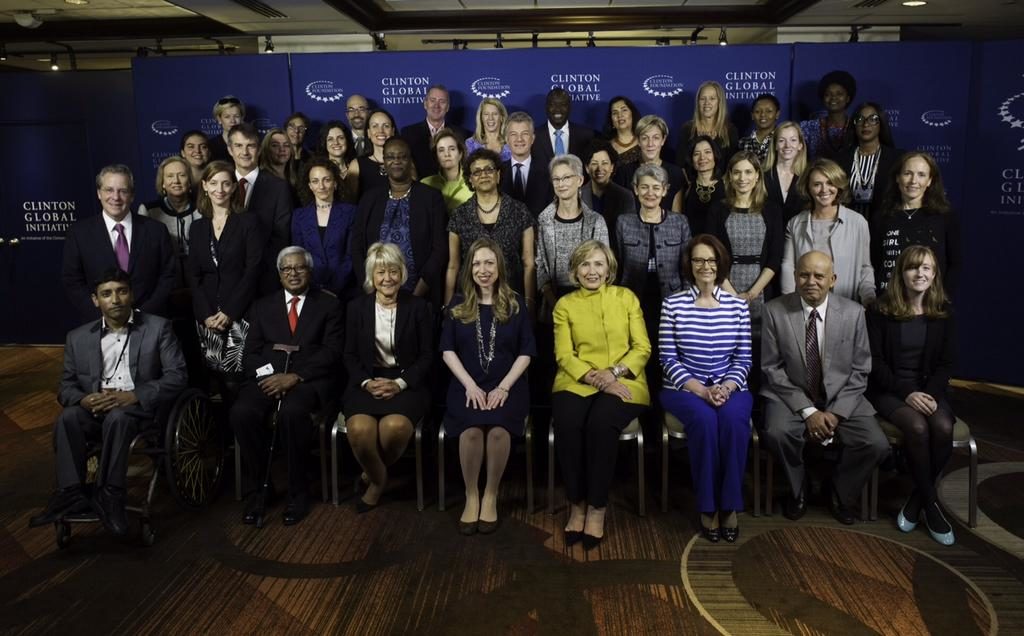GCPEA News
Global Coalition Joins CHARGE, New Clinton Global Initiative Commitment to Protect Girls’ Education in Conflict
GCPEA Press Release, September 24, 2014
New York, September 24, 2014 – Girls’ education must be protected in situations of armed conflict, where schools and students are often targeted for attack, and girls can be disproportionately affected, said the Global Coalition to Protect Education from Attack (GCPEA) today. The Coalition joined more than 30 other organizations participating in “CHARGE” (Collaborative Harnessing Ambition and Resources for Girls’ Education) — a global collective of government, civil society, and private sector organizations working to advance girls’ education globally announced by former U.S. Secretary of State Hillary Clinton, Clinton Foundation Vice Chair Chelsea Clinton, and Ms. Julia Gillard, former Prime Minister of Australia at the 10th Annual Meeting of the Clinton Global Initiative.
At the event, GCPEA committed to providing technical support to at least 10 states in incorporating the Lucens Guidelines for Protecting Schools and Universities from Military Use during Armed Conflict into national policies and military doctrine. The Guidelines were developed through extensive consultation with governments, militaries, UN agencies, and civil society to put an end to the use of schools for military purposes.
“Tens of thousands of girls stand to benefit from our technical support to states in implementing the Lucens Guidelines,” said GCPEA Director Diya Nijhowne. “When soldiers vacate classrooms, playgrounds are free of weapons and ordnance, and military functions are expelled from school premises, there will be real, concrete improvements for students living through conflict.”
The use of schools or universities by armed parties as bases, barracks, weapons caches, firing positions, and for other military purposes is a significant impediment to education in conflict-affected countries. Under international law, when schools are used for military purposes, they may become legitimate military targets, putting them at risk of attack by opposing forces, and threatening the lives of students and teachers within them.
The fear of violence and the disturbing scenes of detention, interrogation, and punishment students and teachers may witness can cause them to experience psychological distress, which can lead to increases in student dropout and teacher absenteeism. Overcrowding may also result from military use of schools, as well as damage and destruction of infrastructure that can have a negative impact on education access and quality. Between 2005 and 2014, national armed forces and non-state armed groups, multinational forces, and even peacekeepers used schools and universities for military purposes in at least 25 countries across four continents.
While all students and education personnel are affected when armed parties use schools, girls are impacted in specific ways. Moreover, the specific impacts of military use of schools on female students can exacerbate inequities in exactly those places where education access and attainment are already a challenge for girls. Families may stop sending their girls to class for fear they will become victims of sexual violence or harassment. For example, in Bihar, India, the presence of 10 paramilitary police officers in Kasma Middle School in 2009 prevented the school from opening a hostel that would allow 200 girls to access education. Parents refused to register their daughters if it meant they would stay on campus with the policemen. Male soldiers may also take control of latrines for their own use, limiting access to toilet facilities and discouraging girls’ attendance, especially adolescent girls.
Girls may also be recruited by armed forces or armed groups, abducted from schools, exposed to sexual violence, or forced into marriage. The kidnapping of more than 200 schoolgirls in northeastern Nigeria in April is one highly publicized incident, but there are many others. For example, Human Rights Watch research found that in Somalia in 2012, after 12 schoolgirls were abducted for forced marriage to Al-Shabaab fighters, some 150 female students dropped out of school.
“Schools must be safe places for both girls and boys so they can learn and develop to their full potential,” said Ms. Gillard, who also chairs the Board of the Global Partnership for Education. “If all countries endorsed and implemented the Lucens Guidelines, it would go a long way toward making schools safe for many of the nearly 30 million out-of-school children living in conflict and crisis.”
So far, 29 countries have expressed support for the Lucens Guidelines publicly, and the Norwegian government is taking the lead to encourage others to follow suit and endorse the Guidelines in a ceremony planned for spring 2015.





